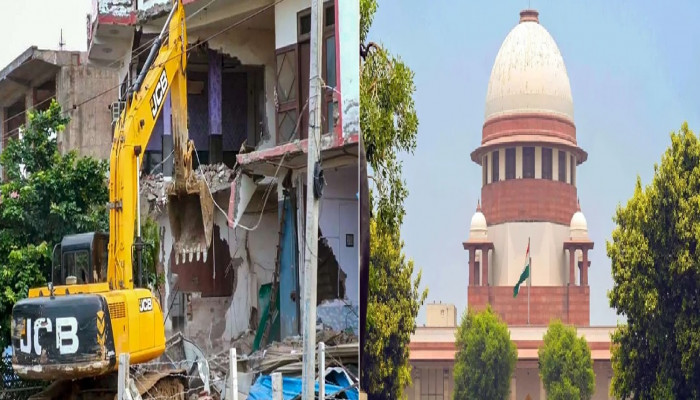Supreme court sets nationwide rules on property demolitions, says 'bulldozer justice' violates rule of law
- In Reports
- 12:51 PM, Nov 13, 2024
- Myind Staff
In a significant ruling on Wednesday, the Supreme Court of India condemned the practice of ‘bulldozer justice’ and established national guidelines for the demolition of properties. Emphasising the importance of the rule of law, the Court made it clear that the Executive does not hold the authority to act as a judge, convict an accused, and demolish their property without due process.
“If the Executive, in an arbitrary manner, demolishes the house of a citizen only on the ground that they are accused of a crime, then it acts contrary to the principles of rule of law,” stated a bench comprising Justices B R Gavai and K V Viswanathan. The bench issued a series of directives, underscoring that no demolition should proceed without a prior show-cause notice. This notice must allow a response period based on local municipal regulations or provide a minimum of 15 days from the date of service, whichever is later.
The ruling asserted that demolishing houses merely because individuals are accused or even convicted of crimes is "totally unconstitutional." Justice Gavai emphasised that “the Executive can’t replace the Judiciary in performing its core function,” reinforcing the fundamental principle of the separation of powers.
In a bid to reassure citizens and mitigate concerns over arbitrary demolitions, the bench exercised its powers under Article 142 of the Constitution to set these guidelines, stating, “We find it necessary to issue certain directions in exercise of our powers under Article 142 of the Constitution.” Article 142 enables the Supreme Court to pass any order deemed necessary for ensuring complete justice.
Furthermore, the Court mandated that even after a demolition order is issued, affected parties must be granted sufficient time to appeal the decision through appropriate channels. For those who choose not to contest, ample time should still be provided to vacate and settle their affairs. “It is not a happy sight to see women, children, and ailing persons dragged to the streets overnight,” the bench noted, adding that “Heavens would not fall on the authorities if they hold their hands for some period.”
The Court directed that demolition notices must be served to property owners by registered post and posted on the structure’s exterior. The 15-day response period will commence from the date of notice receipt. However, the Supreme Court clarified that these protections do not apply to unauthorised structures located on public property, such as streets, footpaths, or areas near railway lines or water bodies. Likewise, cases with existing court-mandated demolition orders are exempt.
In a further step to ensure transparency, the bench ordered that all demolition proceedings be video-recorded. The Court warned that failure to follow these guidelines would result in contempt proceedings against the responsible authorities. “Needless to state that the authorities herein after shall strictly comply with the aforesaid directions issued by us,” the bench affirmed, reiterating that even accused individuals have rights safeguarded by the Constitution and criminal law.
This judgment follows numerous pleas for nationwide guidelines on property demolitions, with petitioners arguing that properties of individuals accused of crimes were being targeted in various states. The Court had reserved its decision on these pleas on October 1 and observed that demolishing property solely because an individual is an accused or even a convict is unjustifiable.
During previous hearings, the Court noted that even a single instance of unlawful demolition contradicts the "ethos" of the Constitution. Last week, in a related case, the Supreme Court declared that citizens' rights cannot be suppressed by threats to destroy their properties, emphasising that “bulldozer justice” has no place in a lawful society.







Comments